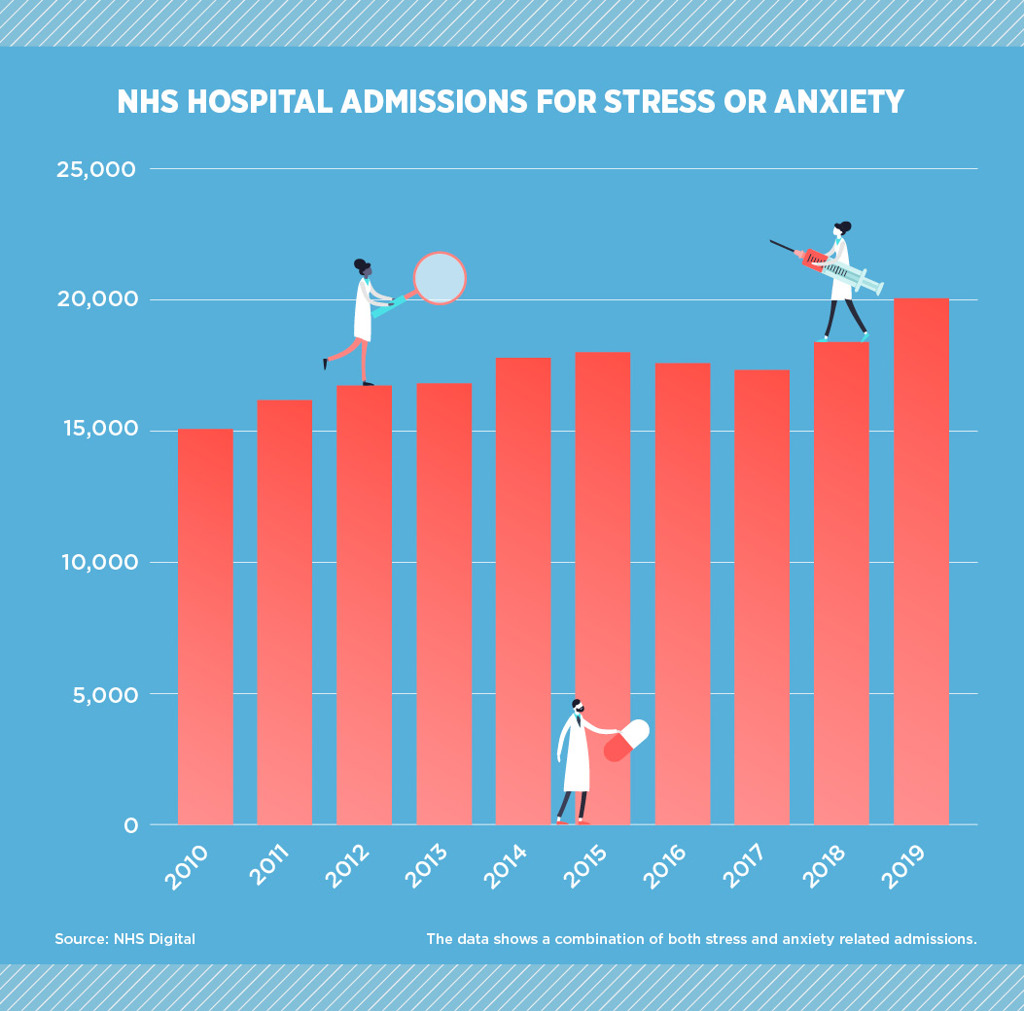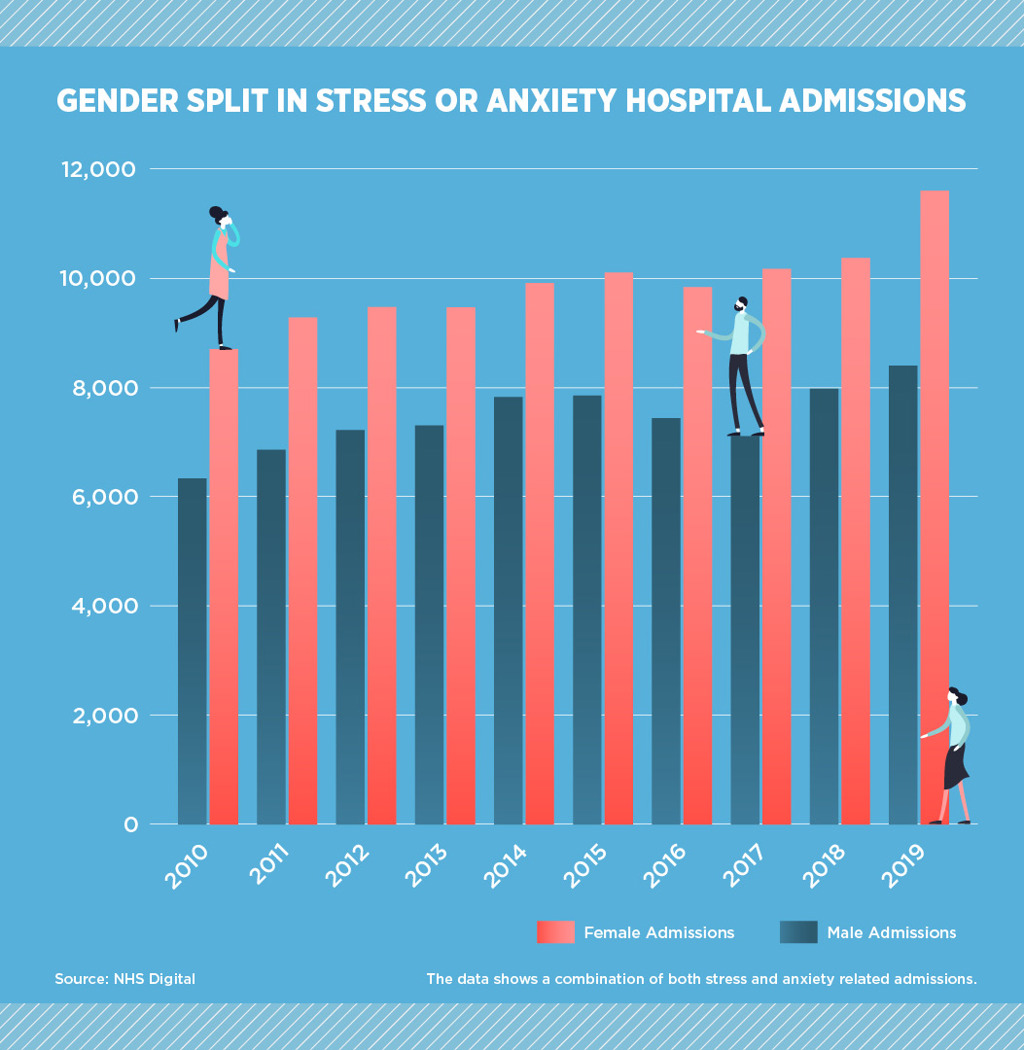Britain is facing a mental health crisis. Research by the Mental Health Foundation found that three-quarters (74%) of Brits felt they were ‘unable to cope’ because of stress at some point last year. Consequently, every year, millions of working days are lost due to stress. But most shockingly, the number of NHS admissions for stress and anxiety is increasing annually. With all of this in mind, it’s clear that the pressures of life are taking a toll on our society.
So, to help raise awareness, we at Tap Warehouse have investigated the rising stress levels in Britain, uncovering how it’s affecting the UK - from the NHS to the workplace. As well as this, we have also revealed the easily accessible ways to relax, both in and outside of work.
In this report we will be covering:
- How Stress-Related Admissions Affect the NHS
- Stress in the Workplace
- The Gender Split in Stress
- Accessible Ways to De-Stress Throughout the Day

Stress-Related Hospital Admissions Have Risen 33% Over the Past 10 Years

After investigating the past ten years worth of NHS hospital admissions for stress and anxiety, the results are alarming. Our research shows that stress has uncomfortably rocketed by 33% over the past decade. In the last two years (2018 and 2019), hospital admissions for stress and anxiety have risen by 9%.
Patients Suffering from Stress Account For 18% More Bed-Days Than Patients In Long Labour
From Apr 2018 to Mar 2019, patients suffering from stress accounted for 158,880 bed-days - costing the NHS £63.5 million. A bed-day refers to the number of days in which a bed is occupied.
In turn, this is 18% more than the number of bed-days for patients in long labour (133,775 days), as well as 22% more bed-days than dementia in Alzheimer patients (130,198 days).
On average, stress and anxiety cost the NHS £71.7 million a year - that’s just in hospital bed fees. In 2018/19, NHS England planned to spend £12.2 billion on mental health, which is 10% of NHS England’s health budget.

For a Quarter of UK’s Workforce, Unemployment Would Be Less Stressful than a Low-Paying Job
The University of Manchester compared the health of those who were unemployed to those who gained work in poor-quality (low-paying or high stress) jobs. The research analysed 1,000 unemployed people, reviewing their health and stress in the following years.
The researchers discovered that chronic stress was distinctly higher for adults who moved into poor quality work than for those who remained unemployed. Not only did the adults who transitioned into poor-quality jobs have higher stress levels, but they were more susceptible to an array of health problems.
Alarmingly, our research found that 27% of the UK’s workforce are employed in low-paying jobs. That amounts to a whopping 8.8 million Brits that may be vulnerable to stress related health issues.
Work-Related Stress Has Risen 29% Over the Past Five Years
Research from the Health and Safety Executive has also revealed the number of workers diagnosed with stress, anxiety or depression has increased by 29% over the past five years.
Unsurprisingly, this has led to 12.8 million working days lost to stress in 2019. This means for every worker that has stress, depression or anxiety, on average they will take 21.2 days off. Sadly, in 2019, stress is responsible for 54% of all working days lost due to poor health.
Not only has this cost employers £42 billion per year but the public too. £14.4 billion worth of tax is missed annually, which means that public services such as healthcare could be missing out on this extra money.
What's more, the single biggest cause of workplace stress is ‘workload’ as reported in 44% of cases of stress. Additionally, 14% of workers felt like a ‘lack of support’ was another main reason they were stressed.

Women Account For 58% Of Stress-Related Hospital Admissions
In the workplace and outside of work, research reveals that women are much more likely to suffer from stress than men. NHS hospital data shows from 2017 to 2019, 58% of stress admissions to hospital were women, compared to just 42% of men.
Similar findings can be seen in the workplace. 59% of reported cases of stress were from women and 41% from men.

Four Reasons Why Women Report More Stress than Men
Reason One: The Gender Pay Gap
Unfortunately, as it currently stands, there are no sectors where women are paid the same as men. In fact, there is an overall pay gap of 11.9% in the UK where men are paid more. This pay gap is not only affecting womens’ finances but their mental health too.
A wellbeing survey by health insurance provider, Cigna, also uncovered that 75% of British women do not feel confident about their finances compared to 62% of men.
Reason Two: Managing Family Life and Work
A woman's responsibilities in the home and their family life could be another key reason why women are more stressed. Research into 6,025 women, comparing full-time working mothers to women who worked but had no children, found a dramatic difference in stress. Working mothers with one child were 18% more stressed. But if working women had two children - their stress levels jumped to 58%.
Reason Three: Women’s Genetics & Hormones
However, another explanation for women feeling more stressed could be due to hormonal differences. The hormones associated with symptoms of depression fluctuate much more in women than men, which can cause an imbalance and lead women to feel stressed. Along with hormone differences, women’s genetics have a stronger predisposition for depression - based on identical and fraternal twin studies.
Reason Four: Men Less Likely to Admit Mental Health Concerns
Despite women seemingly being dealt a bad hand when it comes to stress, there are indications that men deal with just as much stress but perhaps don’t voice their feelings. The Mental Health Foundation found that 28% of men didn’t seek medical help for their most recent mental health concern This is compared to 19% of women.
Sadly, suicide represents the largest cause of death for men under 50. In 2018, 75% of suicides were among men, which has been the case since the 1990s.
Not only are men less likely to disclose their mental health problems, but it appears doctors are less likely to diagnose it in men as uncovered by the World Health Organization. Even when men and women have identical scores on surveys that help diagnose depression, doctors are more prone to diagnose depression in women than men.
So, although research reveals that women are more stressed, it’s most likely due to men not opening up about their mental health.

How Relaxation Can Improve Your Health & Mental Ability
Today’s world is certainly stressful, and there’s no denying we all feel the effects of it. But, telling yourself to relax is sometimes easier said than done. However, that’s no reason to give up just yet. In the video below, Tedx speaker and relaxation expert, Bryan Russell, reveals the secret to relaxation by using breathing techniques.
In the video, he also notes just how important it is to relax, as when we’re in these high-stress states our immune system and cognitive ability is lowered. This means we’re more susceptible to illnesses and making bad decisions.
How to Relax Throughout the Day, According to Science
Our research shows the workplace can be particularly stressful. However, if you’re at work it can be hard to practice de-stressing methods. That’s why Tap Warehouse have analysed the best means of relaxing at every part of your working day, and even at the weekend.
At the Start of Your Day

- Don’t use the snooze button - Going back to sleep after your alarm has gone off confuses your body and brain. Your body starts preparing for a deep sleep, but in fact you’re just getting 5 minutes, making you feel groggy.
- Meditate - Not only has this been shown to help those who suffer from anxiety, but it’s also known to be more helpful than other relaxation techniques.
- Write down your thoughts - Write a to-do list or any thoughts you may have. It’s a nice therapeutic practice and sets up the day in a way that's calm and meditative.
- Eat a low G.I. breakfast - Eating food with a low glycemic index can help you avoid a glucose dip that is known to heighten symptoms of anxiety. Some examples of food with a low G.I. include a vegetable omelette or avocado on toast.
Whilst At Work

- Communicate with your work colleagues - When you chat with another human being, feel good chemicals such as dopamine and oxytocin are released in your brain. What’s more, when you listen, your blood pressure lowers, too.
- Step outside on your lunch break - Whilst you may be tempted to stay indoors during your lunch break, you should definitely consider going for a walk. Research from Heriot-Watt University shows the brain enters a meditative state when walking through green spaces, making you feel calmer and allowing you to reflect.
- Declutter your desk - People who live around clutter have been linked with higher levels of the stress hormone cortisol, according to the University of California. Clutter can be overwhelming to tackle, but if you tidy up throughout your day, it’s easier to keep on top of it.
Before a Meeting or Interview

If you need to reduce stress quickly before an important meeting, you should consider:
- Saying a mantra - Think positively about releasing what is bothering you. Repeat a positive mantra, such as, ‘I am at peace,’ ‘all is well,’ or ‘I love and believe in myself fully.’ This type of meditation can make you more resilient to stress. The University of Wisconsin-Madison revealed it can actually alter your brain’s neural pathways.
- Chewing gum - Cardiff University found that people who chewed gum had a greater sense of wellbeing and lower stress. One possible explanation is that chewing gum causes brain waves similar to those of relaxed people. Or it could be that chewing gum promotes blood flow to your brain.
- Correcting your posture - People who are overly stressed often display their worries in their body posture. Studies from the University of Auckland show that poor posture is related to anxiety, depression, helplessness, and irritability. So, keeping your chin up and shoulders back will help.
After Work

- Socialise with friends or give them a call - Emotional support is an important protective factor for dealing with life’s difficulties. What’s more, loneliness has been associated with a wide variety of health problems including high blood pressure, lower immunity and cardiovascular disease.
- Exercise - Go out for a run or whatever type of activity you enjoy. Exercise reduces levels of the body’s stress hormones, such as adrenaline and cortisol. The NHS recommends you get at least 150 minutes of aerobic activity a week.
- Have a bath - The temperature and pressure of the warm water on your chest, can help you breathe better, making you feel more relaxed and can even lower your blood pressure. Not only that, the University of Freiburg found that taking regular warm baths can elevate the mood amongst people with depression.
- Write down your gratitudes - At the end of each day, take some time to write out three things you are thankful for. Doing this allows you to strengthen your emotional resilience and reduces stress. Reading back over your journal can be a great pick-me-up if you’re having a particularly bad day.
At the Weekend

- Watch or listen to something that makes you laugh - Research from Loma Linda University shows that laughing is a great form of therapy for stress and anxiety. Scientists believe that a good laugh can counteract all the tension-increasing, anxiety-driving processes that go on in your brain.
- Spend time outdoors - Time spent in nature has been linked with lower rates of anxiety and stress. This can be extremely beneficial if you live in a city. Just escaping for 1 or 2 hours allows your brain and body to mellow out.
- Pick up a hobby - Colouring, knitting, writing and reading have all been shown to have numerous mental health benefits, such as relieving stress and anxiety. One study found that reading for just 6 minutes reduces your stress levels by more than half!
No matter who you are or what situation you’re in, it’s apparent that we all feel stressed from time to time. With our research clearly indicating that stress is on the rise in the UK, it’s never been more important to take time to focus on yourself and your mind.
If you feel like stress is getting too much or you believe you’re struggling with your mental health, there’s help available from your GP but mental health charities too, such as Mind and Anxiety UK. However, if you are in immediate distress, visit a local A&E.








